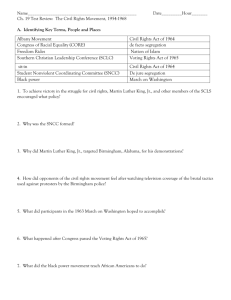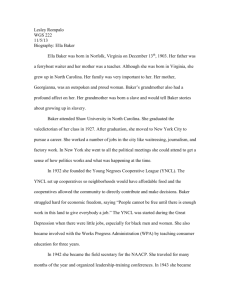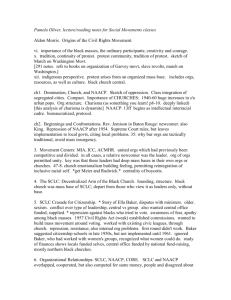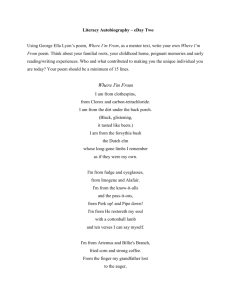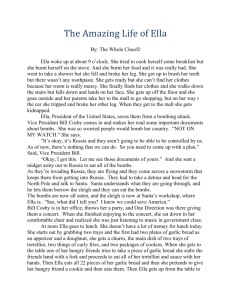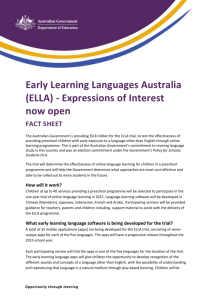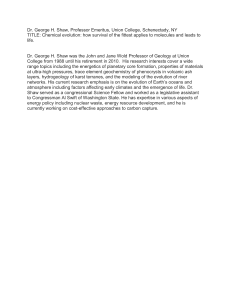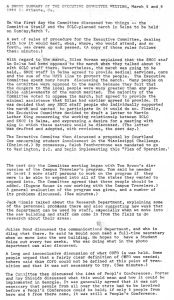Ella Josephine Baker
advertisement
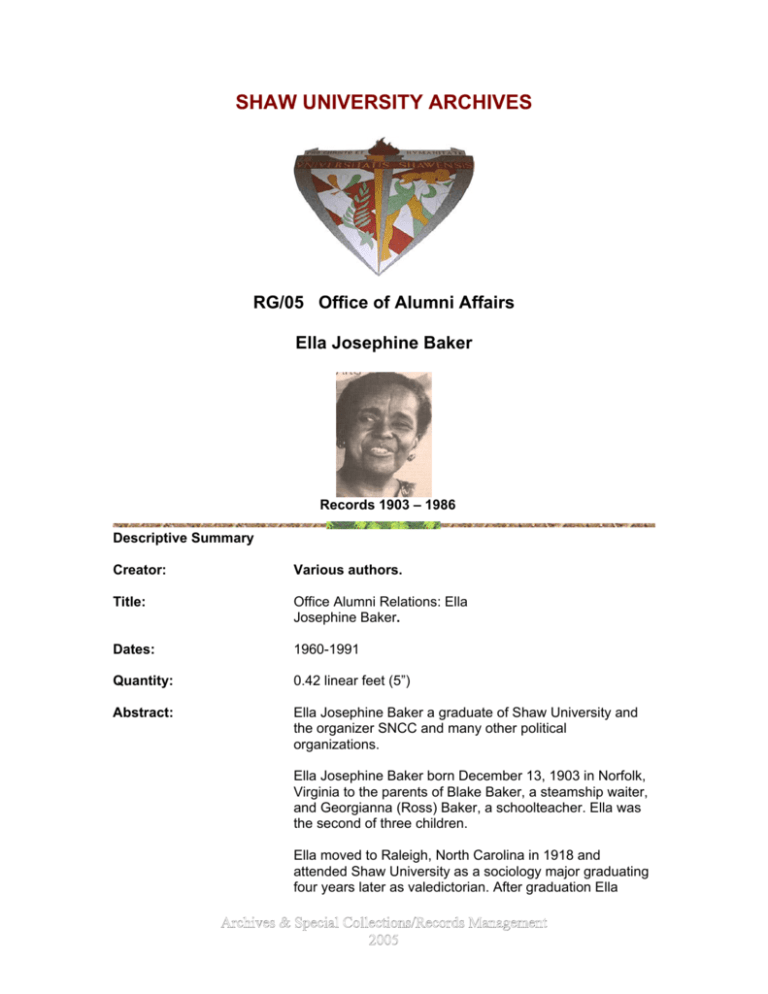
SHAW UNIVERSITY ARCHIVES RG/05 Office of Alumni Affairs Ella Josephine Baker Records 1903 – 1986 Descriptive Summary Creator: Various authors. Title: Office Alumni Relations: Ella Josephine Baker. Dates: 1960-1991 Quantity: 0.42 linear feet (5”) Abstract: Ella Josephine Baker a graduate of Shaw University and the organizer SNCC and many other political organizations. Ella Josephine Baker born December 13, 1903 in Norfolk, Virginia to the parents of Blake Baker, a steamship waiter, and Georgianna (Ross) Baker, a schoolteacher. Ella was the second of three children. Ella moved to Raleigh, North Carolina in 1918 and attended Shaw University as a sociology major graduating four years later as valedictorian. After graduation Ella moved to New York in search of work and there became the well know activist that she is still remember for today. In 1938 Ella married T. J Roberts a longtime friend. In 1943 Ella was appointed national director for the NAACP organization. In 1957 Ella moved to Atlanta to coordinate the SCLC and in 1960 she returned to Shaw University in Raleigh, North Carolina to student college groups organize SNCC (Student Nonviolent Coordinating Committee and served until 1964. This organization grew out of a the sitin’s which was influential in changing the color barriers. Ella was nicknamed “FUNDI” a Swahili word meaning person who teaches a craft to the next generation. A book titled FUNDI and a video recording has been written by Joanne Grant in 1986. Ella Josephine Baker traveled the country speaking on civil rights and helping to organize. She opposed any thing that kept people divided. She was a lecturer, advisor, organizer and activist. Ella Jo Baker died on her 83rd birthday in New York City from a sever asthma attack in 1986. Restrictions None Copyright Notice Copyright is retained by Shaw University as stipulated by United States copyright law. Subject Headings Activist Lecturer Civil Rights Sit-In’s, Personal Names Corporate Names Scope and Content Note SNCC (Student Nonviolent Coordinating Committee) was born during a period of extensive student protest activity. Yet its creator indicated the culmination of the lunch counter sit-in movement rather that the beginning of a new upsurge of student activism. SNCC’s founding was an important step in the transformation of a limited student movement to desegregate lunch counters to achieve major social reform. Baker began a relationship with the NAACP in 1941 serving as National Field Secretary and Director of Branches of member services. She departed the NAACP in 1946 due to differences. Ella’s differences were with major members of the NAACP who wanted the students of SNCC to become a youth wing of the Southern Christian Leadership Conference (SCLC). Ella felt that there was too much leader center orientation rather that a group effort south wide. Ella felt that the students should structure their own movement if they so choose. She refuse to be a part to making a motion at the SCLC that students become a part of SCLC and walked out of the private meeting. The strongest opposition came from Petersburg, VA., (“Southern Patriot” May, 1960). On April 17, 1960 the students decided not to become apart of SCLC but set up a temporary Student Non-violent Coordinating Committee at Shaw University, Raleigh, North Carolina which would become SNCC. SNCC met each month between April and September 1960 with representation from YWCA, CORE, SCLC and NSA. A white seminary student from Virginia, Jane Stembridge became the secretary of SNCC on the recommendation of Fred Shuttlesworth. Until May 1962 the National Office of SNCC was housed at 1971/2 Auburn Avenue, Atlanta Georgia which was directly across the street from SCLC. In 1961 SNCC held a voters registration in McComb, Miss but before the voter registration committee could meet SNCC seem to be coming apart at the seams. It had divided into two separate organizations – the direct action wing and the voter registration wing. SNCC preserved and found a medium and found themselves in McComb where the worst could happen – violence, civil strife and murder happened. Yes, Ella another legacy of nonviolence served as an organizer of people rather than the power of a leader. Preferred Citation Cite as: Office of Alumni Relations 1918-1986,SU- Shaw University Archives & Special Collections/Records Management, Raleigh, North Carolina Shaw University. Repository Shaw University Archives & Special Collections/Records Management Container List: Box 287 Folder Correspondence (From B. Rainbow) 1991 1 Copy of book called Freedom Bound 2 Remembrances by Nydia D. Thomas: Point of View, Winter 1988 3 Commencement Exercise Program June 7, 1927 4 Article: Parting the Waters, 1988 (SNCC) 5 Article: In the Struggle; SNCC and the Black Awakening of the 1990’s 6 Newspaper: The Challenger 1987 7 SCLC Mass Meeting, April 16, 1960 Program 8 News clipping: N&O 12/12/ 2003 Ella Baker Centennial 9
